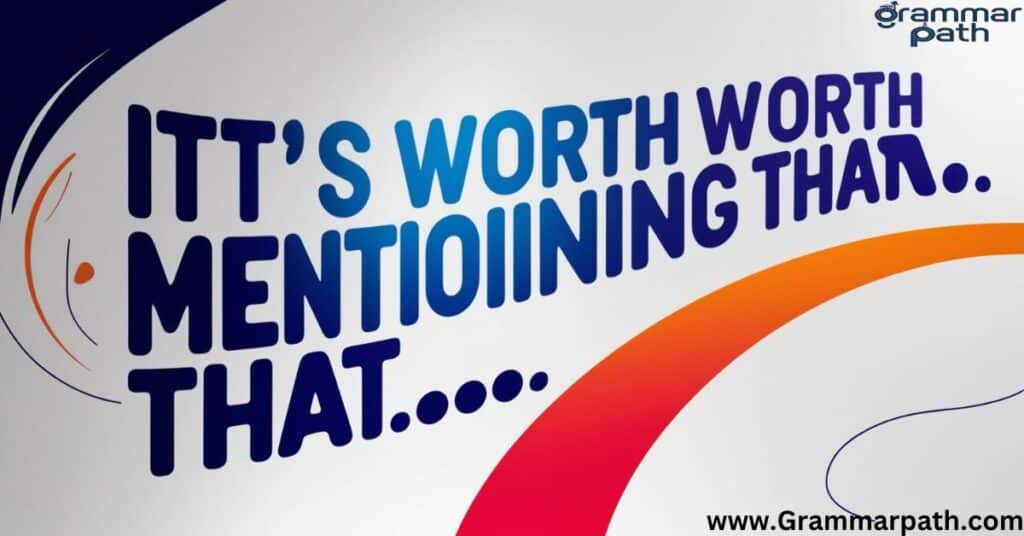
30 Other Ways to Say “Just to Let You Know”
Communication styles are constantly evolving, and finding fresh ways to say something as simple as “just to let you know” can breathe new life into your conversations. Whether you’re crafting an email, sending a quick text, or having a face-to-face chat, varying your language keeps things interesting and can help you better connect with your audience.
In our fast-paced world, we’re always looking for alternatives to express ourselves more effectively. The phrase “just to let you know” has become a staple in our daily communications, but it’s starting to feel a bit stale. That’s why we’ve compiled this list of 30 other ways to convey the same message, each with its own unique flavor and suited for different contexts.
From formal notifications to casual updates, we’ll explore a range of options that’ll help you notify, inform, and convey information with style. These alternatives will not only make you more aware of the diverse ways to communicate, but they’ll also help you emphasize, highlight, and clarify your message in various situations. So, let’s dive in and discover how to spice up your language!
is it Professional to Say: Just to Let You Know
When considering whether it’s professional to say “Just to let you know,” context is key. While the phrase can be appropriate in casual work settings, it might lack the formality required for more official communications. In professional environments, it’s often better to use alternatives that convey a more polished tone.
However, with colleagues you know well, this phrase can strike a balance between informality and keeping others informed.
What to Say Instead of “Just to Let You Know”
- I would like to inform you that…
- Please be advised that…
- For your awareness…
- I want to clarify that…
- It’s important to note that…
- To ensure there is no confusion…
- Just a heads up…
- FYI…
- So you’re aware…
- It is imperative that you know…
- I must emphasize that…
- It is crucial for you to be aware that…
- You might find it interesting to know that…
- You might like to be aware of…
- I thought you should be informed that…
- Attention:…
- Please take note that…
- Be mindful that…
- Urgent:…
- I’d like to bring to your attention…
- It may be beneficial to know that…
- As an FYI…
- I believe it’s relevant to mention that…
- It’s worth mentioning that…
- I’d like to draw your attention to…
- You should be aware that…
- Allow me to inform you…
- I thought you’d want to know…
- It has come to my attention that…
- I feel compelled to mention…
“30 Unique Phrases to Say ‘Just to Let You Know’—Elevate Your Conversations Effortlessly!”
Here are “30 Unique Phrases to Say ‘Just to Let You Know’—Elevate Your Conversations Effortlessly!”:
1. “I would like to inform you that…”
This phrase strikes a formal tone, perfect for professional settings or when you need to convey important information with a touch of gravitas.
Example scenario (Email): Subject: Project Timeline Update
Dear Sarah,
I would like to inform you that the deadline for the Johnson account has been extended by two weeks. This adjustment will allow our team to incorporate the additional features requested by the client.
Best regards, Michael
2. “Please be advised that…”
Use this when you need to caution or alert someone about a situation that requires their attention.
Example scenario (Company-wide announcement): Attention all employees,
Please be advised that the parking garage will be undergoing maintenance next week. Alternative parking arrangements have been made at the nearby public lot. We appreciate your cooperation during this time.

3. “For your awareness…”
This phrase is useful when you want to keep someone in the loop without necessarily requiring action on their part.
Example scenario (Internal memo): To: Marketing Team
For your awareness, we’ve received positive feedback on our latest ad campaign. The client has expressed interest in extending our contract for another year.
4. “I want to clarify that…”
When you need to emphasize a point or correct a misunderstanding, this phrase can help set the record straight.
Example scenario (Text message): Hey Alex, I want to clarify that the meeting tomorrow is at 2 PM, not 3 PM as originally planned. Don’t want you to be late!
5. “It’s important to note that…”
This phrase is great for highlighting crucial information that shouldn’t be overlooked.
Example scenario (Project brief): As we move forward with the website redesign, it’s important to note that all pages must be mobile-responsive. This is a key requirement from our client and should be prioritized in our development process.
6. “To ensure there is no confusion…”
Use this when you want to prevent misunderstandings and make sure everyone is on the same page.
Example scenario (Team email): Hi team,
To ensure there is no confusion, I’d like to recap our roles for the upcoming presentation:
- Jake: Introduction and market analysis
- Emma: Product features and benefits
- Olivia: Q&A session
Please review and let me know if you have any questions.

7. “Just a heads up…”
This casual phrase is perfect for informal situations or when you’re giving a quick update to colleagues or friends.
Example scenario (Instant message): Just a heads up, the printer on the second floor is out of ink. Might want to use the one in the lobby if you need to print anything urgently.
8. “FYI…”
Short, sweet, and to the point, “FYI” (For Your Information) is great for quick updates in informal settings.
Example scenario (Email): Subject: FYI – New Coffee Machine
Hey everyone,
FYI, we’ve got a new coffee machine in the break room. It’s got all sorts of fancy options, so feel free to experiment!
Enjoy your caffeine boost, Lisa
9. “So you’re aware…”
This phrase strikes a balance between formal and casual, making it versatile for various situations.
Example scenario (Phone conversation): “Hey Tom, so you’re aware, we’ve rescheduled the client meeting to next Tuesday. It should give us more time to prepare the presentation.”
10. “It is imperative that you know…”
When you need to convey urgency or extreme importance, this phrase can help grab attention.
Example scenario (Emergency notification): Attention all residents,
It is imperative that you know we’ve detected a gas leak in Building C. Please evacuate immediately and follow the emergency procedures outlined in your resident handbook.
11. “I must emphasize that…”
Use this when you want to stress the significance of a particular point or decision.
Example scenario (Performance review): David, I must emphasize that your contributions to the Smith project were exceptional. Your innovative solutions significantly improved our client satisfaction rates.
12. “It is crucial for you to be aware that…”
This phrase combines urgency with importance, perfect for situations that require immediate attention and understanding.
Example scenario (Safety announcement): Dear employees,
It is crucial for you to be aware that we’ve updated our fire safety protocols. Please familiarize yourself with the new procedures posted in common areas.

13. “You might find it interesting to know that…”
When you have information that’s not urgent but potentially intriguing or useful, this phrase can pique interest.
Example scenario (Casual conversation): “Hey Sarah, you might find it interesting to know that the new café down the street offers a 20% discount to local business employees. Thought you might want to check it out for your coffee breaks!”
14. “You might like to be aware of…”
This phrase is helpful when sharing information that could be beneficial or relevant to the recipient.
Example scenario (Email to a colleague): Hi Mark,
You might like to be aware of a new project management tool our IT department just rolled out. It’s got some great features for tracking deadlines and collaborating on documents. Let me know if you want a quick demo!
Best, Emily
15. “I thought you should be informed that…”
Use this when you want to share important information without sounding too formal or urgent.
Example scenario (Text to a friend): Hey Jessica, I thought you should be informed that the movie we wanted to see is sold out for Saturday night. Shall we look at Sunday showtimes instead?
16. “Attention:…”
This direct approach is great for announcements or when you need to capture someone’s focus quickly.
Example scenario (Office memo): Attention: All Marketing Department Staff
We’ll be holding a brainstorming session this Friday at 2 PM in Conference Room A. Please come prepared with ideas for our upcoming summer campaign.
17. “Please take note that…”
When you want to ensure information isn’t overlooked, this phrase can help emphasize its importance.
Example scenario (Event reminder): Dear attendees,
Please take note that the venue for tomorrow’s workshop has changed. We’ll now be meeting at the Downtown Convention Center, Room 305. Don’t forget to bring your laptops!
18. “Be mindful that…”
This phrase is useful when you want to gently remind someone of an important fact or consideration.
Example scenario (Team leader to team member): “Alex, great job on the proposal. As you finalize it, be mindful that the client prefers concise reports. Try to keep it under 10 pages if possible.”
19. “Urgent:…”
When time is of the essence, starting your message with “Urgent:” can help ensure it gets immediate attention.
Example scenario (Email subject line): Urgent: Server Maintenance Tonight
Dear IT Team,
We need all hands on deck for an emergency server maintenance tonight at 11 PM. Please confirm your availability ASAP.

20. “I’d like to bring to your attention…”
This phrase is perfect for highlighting information in a polite and professional manner.
Example scenario (Manager to employee): “Emma, I’d like to bring to your attention the excellent feedback we received from the client about your presentation. Your hard work has really paid off!“
21. “It may be beneficial to know that…”
Use this when you want to share potentially useful information without being pushy.
Example scenario (Colleague to colleague): “Hey John, it may be beneficial to know that the finance department is offering a workshop on the new expense reporting system next week. Might save you some time in the long run if you attend.”
22. “As an FYI…”
This casual alternative to “FYI” can be used in slightly more formal situations while still maintaining a friendly tone.
Example scenario (Email to team): Subject: Office Supplies Update
Hi team,
As an FYI, we’ve restocked the supply closet with those ergonomic mouse pads many of you requested. Feel free to grab one if you need it!
Cheers, Samantha
23. “I believe it’s relevant to mention that…”
When you want to add a piece of information that might not be crucial but could be important, this phrase works well.
Example scenario (Project meeting): “Before we wrap up, I believe it’s relevant to mention that the marketing team is launching a new campaign next month. We might want to consider aligning our product release with their timeline for maximum impact.”
Pro Tips: The most important paragraph in this article is the introduction, as it sets the tone and explains why exploring alternatives to “just to let you know” is valuable. It emphasizes the importance of varied communication styles and how they can enhance our daily interactions.
To make the most of these alternative phrases:
- Context is key: Choose the appropriate phrase based on the formality of the situation and your relationship with the recipient.
- Tone matters: Be mindful of how each phrase might be perceived. Some are more urgent, while others are more casual.
- Mix it up: Don’t rely on just one or two alternatives. Vary your language to keep your communication fresh and engaging.
- Be concise: While these phrases can add flair to your messages, remember that clarity is still paramount. Don’t sacrifice clarity for style.
- Practice: Try incorporating these phrases into your daily communications. The more you use them, the more natural they’ll feel.
24. “It’s worth mentioning that…”
This phrase is perfect for adding valuable information that might not be crucial but could be beneficial to the recipient.
Example scenario (Team meeting): “Before we move on to the next agenda item, it’s worth mentioning that our competitors have just launched a similar product. We might want to discuss how this affects our marketing strategy.”

25. “I’d like to draw your attention to…”
Use this when you want to highlight a specific point or detail that you believe is particularly important.
Example scenario (Email to client): Dear Mr. Johnson,
I’d like to draw your attention to the revised budget proposal on page 5 of the report. We’ve managed to reduce costs by 15% without compromising on quality.
Best regards, Amanda
26. “You should be aware that…”
This phrase strikes a balance between informing and cautioning, making it useful for situations where the information might require action or consideration.
Example scenario (HR announcement): To all employees,
You should be aware that we’re updating our vacation policy next month. Please review the changes in the employee handbook to understand how this might affect your leave planning.
27. “Allow me to inform you…”
This formal phrase is excellent for professional settings or when you want to convey information with a touch of authority.
Example scenario (Business letter): Dear Ms. Thompson,
Allow me to inform you that your application for the Senior Developer position has been received and is currently under review. We anticipate making a decision within the next two weeks.
Sincerely, Robert Smith HR Manager
28. “I thought you’d want to know…”
This friendly and considerate phrase works well in both personal and professional contexts, especially when sharing information you believe the recipient will find valuable or interesting.
Example scenario (Text to a colleague): Hey Lisa, I thought you’d want to know that the project you worked on last quarter just won an industry award. Congrats on your contribution to its success!
29. “It has come to my attention that…”
Use this phrase when you’ve recently learned something important that needs to be shared, especially in professional or formal situations.
Example scenario (Manager to team): Team,
It has come to my attention that there’s been some confusion about the new filing system. I’ll be organizing a brief training session next week to ensure everyone is on the same page.
30. “I feel compelled to mention…”
This phrase is useful when you want to share information that you believe is crucial, even if it might be slightly uncomfortable or unexpected.
Example scenario (Feedback session): “James, your presentation was excellent overall. However, I feel compelled to mention that some of the data points seemed outdated. Let’s work together to ensure we’re using the most current information in future reports.”

Pro Tips:
To make the most of these additional alternatives:
- Gauge the situation: Consider the context and your relationship with the recipient before choosing a phrase. Some are more formal, while others are better suited for casual interactions.
- Personalize your approach: Tailor the phrase to your personal communication style. This will help your messages sound more authentic and natural.
- Consider the impact: Think about how the recipient might react to the information and choose a phrase that sets the right tone for your message.
- Follow up appropriately: Depending on the importance of the information shared, be prepared to provide additional details or answer questions that may arise.
- Practice active listening: When using these phrases in spoken communication, pay attention to the recipient’s reaction and adjust your tone or provide more information if needed.
Conclusion
By expanding your communication toolkit with these 30 other ways to say “just to let you know,” you’ll be able to convey information more effectively and engage your audience in various contexts.
Whether you’re writing an email, sending a text, or having a face-to-face conversation, these alternatives will help you communicate with clarity, style, and impact. So go ahead, give them a try, and watch how they transform your interactions!

Emily Olivia is an experienced writer specializing in grammar and English language topics. With a passion for clarity and precision, she shares valuable insights on synonyms, grammar rules, and writing tips to help readers enhance their language skills on Grammar Path.





